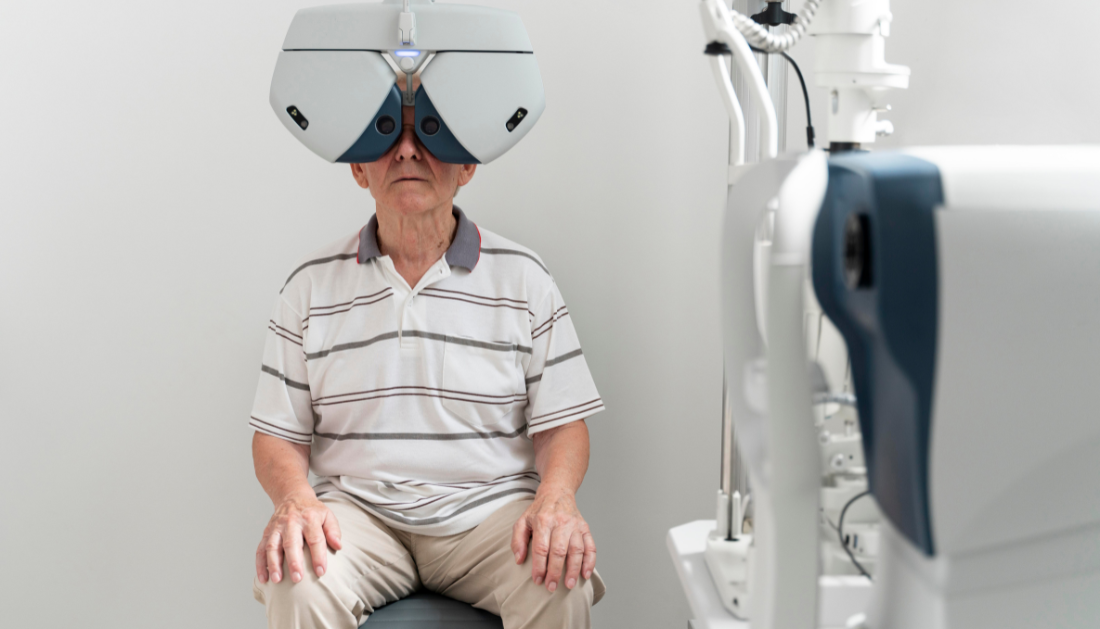

A new robot radiotherapy system has been successfully utilized by researchers from King’s College London and doctors from King’s College Hospital NHS Foundation Trust to improve therapy for a debilitating eye illness.
The specially designed robot radiotherapywas utilized to treat wet neovascular age-related macular degeneration (AMD). Patients received routine injections into their eyes after receiving a single, less intrusive radiation dose.
It was discovered in the historic trial, which was published in The Lancet, that patients required fewer injections to successfully manage the illness, possibly saving up to 1.8 million injections annually worldwide.
The severe eye illness known as wet AMD is caused by aberrant new blood vessels growing into the macula, the layer of cells in the rear of the eyeball that senses light. After that, the arteries begin to bleed blood and fluid, which usually results in an abrupt, severe, and permanent loss of vision.
AMD is estimated to impact 196 million individuals worldwide and over 700,000 people in the United Kingdom, according to the Royal College of Ophthalmologists. The aging population of the nation is predicted to cause the number of AMD patients to rise by 60% by 2035.
Currently, injections into the eye on a daily basis are used to treat wet AMD. A patient’s vision is significantly improved at the beginning of treatment. However, because the injections don’t treat the illness, patients will eventually need long-term, recurrent treatments when fluid starts to accumulate again in the macula. The majority of people need an injection every one to three months, and eye injections—which may cost anywhere from £500 to £800—have emerged as one of the most popular NHS treatments.
Three intensely focused radiation beams are directed into the affected eye as part of the novel treatment, which offers significantly better targeting than current techniques. Researchers discovered that patients receiving robotic radiation needed fewer injections to manage their illness than those receiving conventional care.
According to the study, because the robotic radiotherapy device requires fewer injections, it saves the NHS £565 for every patient treated over the first two years.
Professor Timothy Jackson, a consultant ophthalmic surgeon at King’s College Hospital and the study’s lead author, stated, “Previous research has attempted to find a better way to target radiation therapy to the macula, such as by repurposing devices used to treat brain tumors. However, nothing has been able to target macular degeneration that might be smaller than 1 mm in diameter up to this point.
“With this purpose-built robotic system, we can be incredibly precise, using overlapping beams of radiation to treat a very small lesion in the back of the eye. Patients generally accept that they need to have eye injections to help preserve their vision, but frequent hospital attendance and repeated eye injections isn’t something they enjoy. By better stabilizing the disease and reducing its activity, the new treatment could reduce the number of injections people need by about a quarter. Hopefully, this discovery will reduce the burden of treatment that patients have to endure.”
Dr. Helen Dakin, University Research Lecturer at the University of Oxford, said, “We found that the savings from giving fewer injections are larger than the cost of robot-controlled radiotherapy. This new treatment can therefore save the NHS money that can be used to treat other patients, while controlling patients’ AMD just as well as standard care.”
more recommended stories
 Phage Therapy Study Reveals RNA-Based Infection Control
Phage Therapy Study Reveals RNA-Based Infection ControlKey Takeaways (Quick Summary) Researchers uncovered.
 Safer Allogeneic Stem Cell Transplants with Treg Therapy
Safer Allogeneic Stem Cell Transplants with Treg TherapyA new preclinical study from the.
 AI in Emergency Medicine and Clinician Decision Accuracy
AI in Emergency Medicine and Clinician Decision AccuracyEmergency teams rely on rapid, accurate.
 Innovative AI Boosts Epilepsy Seizure Prediction by 44%
Innovative AI Boosts Epilepsy Seizure Prediction by 44%Transforming Seizure Prediction in Epilepsy Seizure.
 Hypnosis Boosts NIV Tolerance in Respiratory Failure
Hypnosis Boosts NIV Tolerance in Respiratory FailureA New Approach: Hypnosis Improves NIV.
 Bee-Sting Microneedle Patch for Painless Drug Delivery
Bee-Sting Microneedle Patch for Painless Drug DeliveryMicroneedle Patch: A Pain-Free Alternative for.
 AI Reshapes Anticoagulation in Atrial Fibrillation Care
AI Reshapes Anticoagulation in Atrial Fibrillation CareUnderstanding the Challenge of Atrial Fibrillation.
 Hemoglobin as Brain Antioxidant in Neurodegenerative Disease
Hemoglobin as Brain Antioxidant in Neurodegenerative DiseaseUncovering the Brain’s Own Defense Against.
 Global Data Resource for Progressive MS Research (Multiple Sclerosis)
Global Data Resource for Progressive MS Research (Multiple Sclerosis)The International Progressive MS Alliance has.
 AI Diabetes Risk Detection: Early T2D Prediction
AI Diabetes Risk Detection: Early T2D PredictionA new frontier in early diabetes.

Leave a Comment